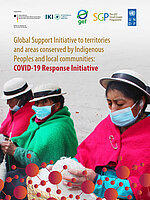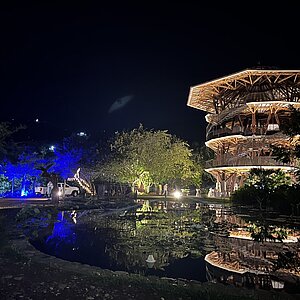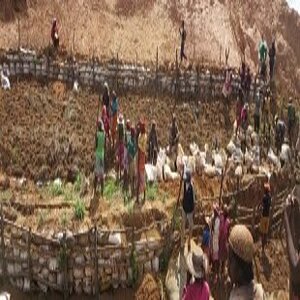Indigenous peoples and local communities as conservation partners

Since 2013, the International Climate Initiative (IKI) has supported indigenous peoples and local communities (IPLCs) in their efforts to manage protected areas
In many cases, indigenous peoples and local communities (IPLCs) have been acting as environmental stewards for centuries, based on their deep relationships to other species and strong spiritual bonds with the natural habitats in which they live. Accordingly, IPLCs actively protect and preserve an astonishing variety of species, habitats and ecosystems worldwide: their comprehensive contribution to a healthy planet forms the basis for clean water and clean air, nutritious food and sustainable livelihoods for people, far beyond the boundaries of their own territories. In addition, their activities are also very important for the world’s cultural, linguistic, tangible and intangible heritage.
Experts are increasingly recognising the role played by IPLCs, and the methods that they use to protect and manage their territories. In more and more cases, IPLCs are getting recognised as critical actors in the governance and management of protected and conserved areas. These Indigenous Peoples’ and Community-Conserved Areas and Territories (ICCAs) currently cover around 32 percent of the Earth’s surface and account for at least 36 percent of the most biodiverse areas of our planet.
Broadening the spectrum to improve livelihoods
Since 2013, the International Climate Initiative (IKI) has supported this approach with its project, ‘Support to indigenous peoples’ and community conserved areas and territories (ICCAs)’ also known as the ‘Global Support Initiative for territories and areas conserved by indigenous peoples and local communities (ICCA-GSI)’. This project aims to expand both the spectrum, governance diversity and quality of protected and conserved areas, while also improve the sustainable livelihoods of indigenous peoples and local communities.
 ICCA-GSI project work addresses three key points, at different levels. At the local level, direct support is targeted at activities to promote positive ICCA stewardship, with particular effort being directed towards protecting ecosystems, safeguarding sustainable livelihoods and tackling poverty. At the national level, the project works to foster legal and political support for the recognition and preservation of ICCAs, while also evaluating the management and governance of protected and conserved areas. At regional and global level, the focus is on networking and promoting knowledge transfer between civil society initiatives that are based in a number of countries. At the same time, ICCA-GSI activities also work towards achieving the Aichi 2020 targets from the Convention on Biological Diversity (CBD) at both national and global level, with a particular focus on targets 11 (protected areas increased and improved), 14 (ecosystems and essential services safeguarded) and 18 (traditional knowledge respected and integrated). The project is also contributing towards the new Post-2020 Global Biodiversity Framework, and the Local Communities and Indigenous Peoples Platform launched under the United Nations Framework Convention on Climate Change.
ICCA-GSI project work addresses three key points, at different levels. At the local level, direct support is targeted at activities to promote positive ICCA stewardship, with particular effort being directed towards protecting ecosystems, safeguarding sustainable livelihoods and tackling poverty. At the national level, the project works to foster legal and political support for the recognition and preservation of ICCAs, while also evaluating the management and governance of protected and conserved areas. At regional and global level, the focus is on networking and promoting knowledge transfer between civil society initiatives that are based in a number of countries. At the same time, ICCA-GSI activities also work towards achieving the Aichi 2020 targets from the Convention on Biological Diversity (CBD) at both national and global level, with a particular focus on targets 11 (protected areas increased and improved), 14 (ecosystems and essential services safeguarded) and 18 (traditional knowledge respected and integrated). The project is also contributing towards the new Post-2020 Global Biodiversity Framework, and the Local Communities and Indigenous Peoples Platform launched under the United Nations Framework Convention on Climate Change.
The ICCA-GSI is implemented by the United Nations Development Programme (UNDP) as part of the Global Environmental Facility (GEF) Small Grants Programme (SGP). Key project partners include the United Nations Environment Programme World Conservation Monitoring Centre (UNEP WCMC), the International Union for Conservation of Nature’s Global Programme on Protected Areas (IUCN GPAP), the ICCA Consortium and the Secretariat of the Convention on Biological Diversity (CBD).
Restructuring with GPS in Belize
 The SGP uses a competitive selection process to award grants for specific measures at the local level and a participatory approach in capacity development to ensure community ownership and sustainability of impact. Examples of IKI project successes include a productivity boost for the Green Creek Farmers’ Cooperative in Belize in Central America, which has been sustainably managing around a thousand hectares of pristine forest since the 1980s. A forest zoning system implemented via GPS data has recently enabled a restructuring of this ICCA, which now consists of three zones: a conservation zone, a cacao agroforestry zone and a subsistence farming multiple-use zone. Sustainable management has safeguarded the long-term preservation of the indigenous territories while allowing agricultural and non-timber production to be increased. The road infrastructure was also extended by 6.5 km, which will make daily trips to work and school much easier, especially in the rainy season.
The SGP uses a competitive selection process to award grants for specific measures at the local level and a participatory approach in capacity development to ensure community ownership and sustainability of impact. Examples of IKI project successes include a productivity boost for the Green Creek Farmers’ Cooperative in Belize in Central America, which has been sustainably managing around a thousand hectares of pristine forest since the 1980s. A forest zoning system implemented via GPS data has recently enabled a restructuring of this ICCA, which now consists of three zones: a conservation zone, a cacao agroforestry zone and a subsistence farming multiple-use zone. Sustainable management has safeguarded the long-term preservation of the indigenous territories while allowing agricultural and non-timber production to be increased. The road infrastructure was also extended by 6.5 km, which will make daily trips to work and school much easier, especially in the rainy season.
Solutions to land usage conflicts
A further example is the support provided to the Olengapa ICCA in northern Tanzania. Encompassing around 30,000 hectares, this area is home to four villages and consists mostly of grazing land. Animal husbandry is the main source of income for the Maasai pastoralists who live here, while the Akie are hunters and gatherers. Both of these indigenous communities possess unique traditional and cultural values for environmental protection. However, the preservation of these ecosystems is threatened by land usage conflicts between villages, encroachment from external parties and a lack of awareness about sustainable land use. Consequences include deforestation, the introduction of non-native species and unsustainable agricultural practice.
To improve this situation, grazing areas and sacred natural sites were identified within the ICCA, and demarcated as part of a Joint Village Land-Use Plan. Part of this plan included training for community members on the topics of environmental protection and sustainable agricultural methods. The measures proved successful, not only leading to an increase of biomass in the protected grazing lands and therefore to healthier livestock but also to a greater diversity of agricultural crop plants and medicinal herbs. Participative workshops also worked to boost autonomy and environmental justice for women and adolescents.
Another significant achievement of this project was the formal recognition of the four villages, which now have an official title of ownership to their land. This fosters solidarity among the communities while protecting them from external encroachments and land grabs.
Funding top-ups during the coronavirus pandemic
Indigenous peoples and local communities are some of the populations at greatest risk from Covid-19 around the world. Impact on these groups has been disproportionate, and they often have no access to healthcare provision, basic services, sanitary facilities or other important preventive health measures.
Accordingly, IKI has topped up ICAA-GSI funding by EUR 15 million as part of its Corona Response Package. This additional finance is intended to help mitigate the social and economic effects of the pandemic, and build resilience for the future. A second phase has now been made possible for this project, whose measures will concentrate on eight separate thematic fields, including food production systems, preventive measures for future pandemics, and the transfer of indigenous and local knowledge. In this way, IKI is also ensuring that IPLCs and ICCAs will play a larger role in the protection of our planet in the future.
This article is part of the IKI Annual Report 2020 - Active for International Climate Protection. For more information, please visit the special page on the IKI Annual Report 2020.
The link has been copied to the clipboard
Contact
IKI Office
Zukunft – Umwelt – Gesellschaft (ZUG) gGmbH
Stresemannstraße 69-71
10963 Berlin










![[Translate to English:]](/fileadmin/_processed_/a/5/csm_20221215_CBDCOP15_2029ff5619.jpg)

![[Translate to English:] Walhai](/legacy/_processed_/d/4/csm_20210608_Walhai_Miguel_Schmitter_0106af1a48.jpg)

